Introduction: 
Deciding on the appropriate business structure is a crucial step in establishing your enterprise. Two common options are sole proprietorship and corporation, each with its advantages and considerations. In this blog post, we’ll compare sole proprietorship and corporation to help you make an informed decision for your business.
Sole Proprietorship:
- Ownership and Control:
- Sole proprietors have complete control over their business and its operations. They make all decisions independently.
- Liability:
- Personal liability is a significant consideration. As a sole proprietor, your personal assets are at risk for business debts and liabilities.
- Taxation:
- Sole proprietors report business income on their personal tax returns. This simplicity can be an advantage, but it also means that business profits are taxed at the individual’s personal tax rate.
Corporation:
- Ownership and Control:
- Corporations have a more complex structure with shareholders, directors, and officers.Ownership is divided among shareholders, but day-to-day operations are typically overseen by officers and managed by directors.
- Liability:
- Shareholders in a corporation generally have limited liability. Their personal assets are typically protected, and the corporation assumes most of the business liabilities.
- Taxation:
- Corporations are taxed separately from their owners. This can result in potential tax advantages, such as lower corporate tax rates for certain income levels.
Considerations for Your Business:
- Scale and Growth:
- Sole proprietorships are suitable for small businesses, while corporations are often preferred for larger enterprises with significant growth potential.
- Risk Tolerance:
- Assess your risk tolerance. If protecting personal assets is a top priority, a corporation’s limited liability may be more suitable.
- Tax Planning:
- Consider your long-term tax planning goals. Corporations offer more flexibility in managing and optimizing tax obligations.
Consult with Ivy Tax & Business Inc:
Choosing between a sole proprietorship and a corporation depends on your business goals, risk tolerance, and growth aspirations. Ivy Tax & Business Inc can provide personalized advice to guide you through the decision-making process and ensure your choice aligns with your business vision.
Conclusion:
Deciding between a sole proprietorship and a corporation involves weighing the advantages and disadvantages of each structure against your business needs. By carefully considering factors such as ownership, liability, and taxation, you can make a decision that sets the foundation for your business’s success. Contact Ivy Tax & Business Inc for expert guidance tailored to your specific business situation.
This article is intended solely for informational purposes and does not constitute legal, financial, or professional advice. Readers are advised to consult professionals in the relevant fields before taking any action to obtain personalized advice.
